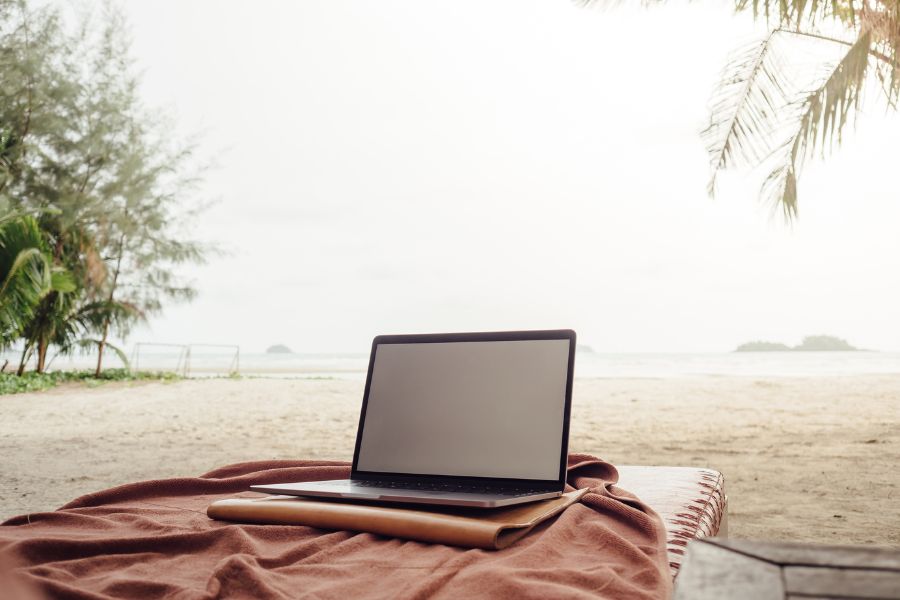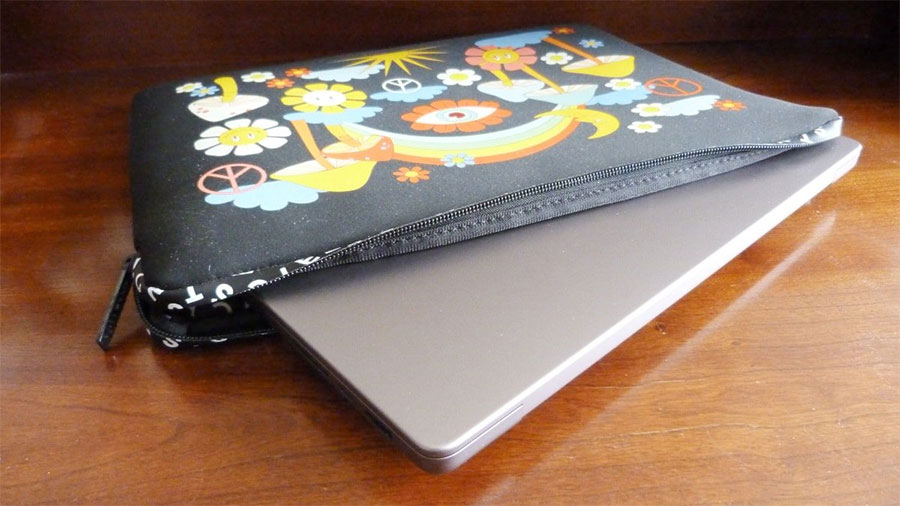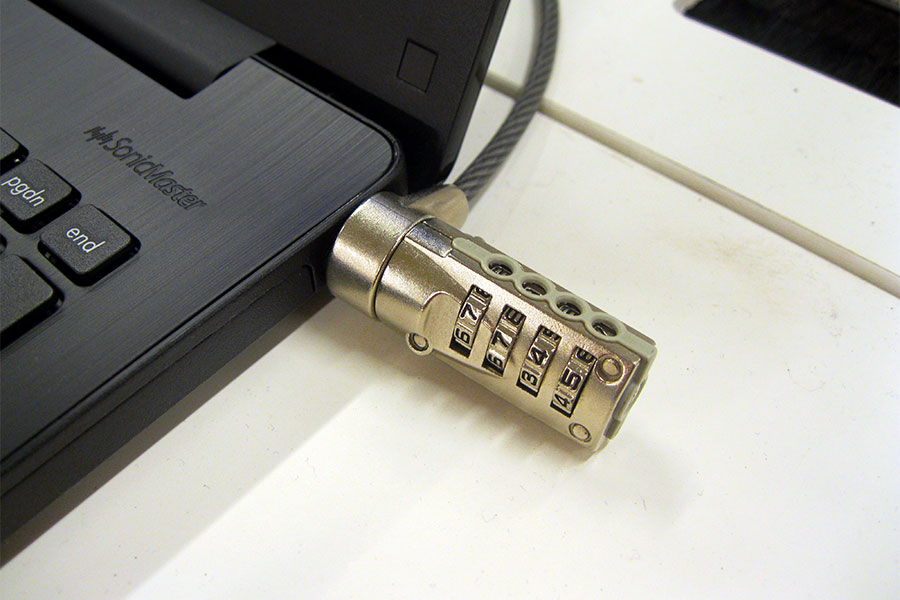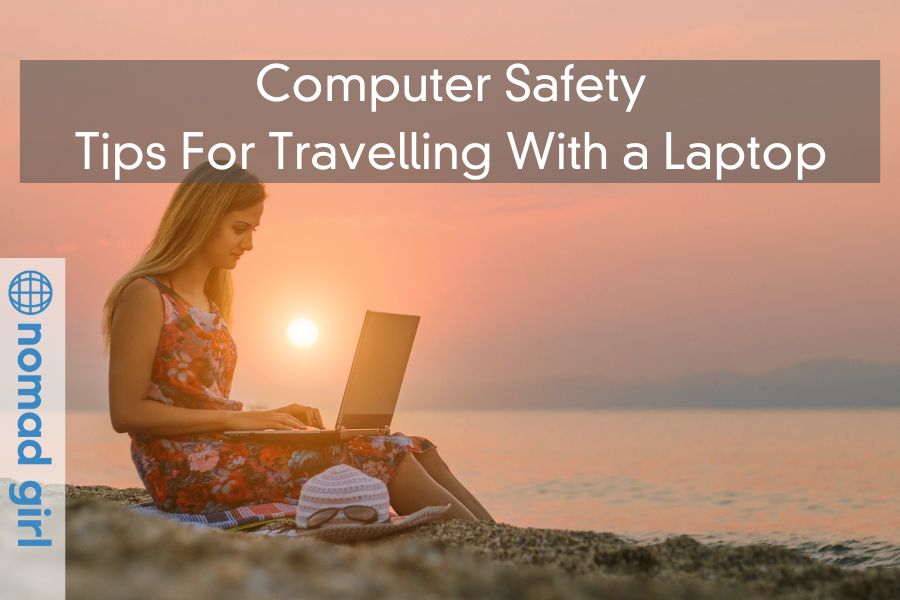Travelling with a laptop can offer numerous benefits, such as keeping up with work, booking online tickets, staying connected with family, and editing photos and videos. However, it’s important to consider a few safety factors when deciding to pack it in your suitcase or backpack.
Do I actually need a laptop?

If you’re planning a two-week vacation at a resort, it might be unnecessary to bring your laptop along. Instead, you can focus on enjoying your trip and postpone blogging, and editing photos, and videos until you return home.
For bloggers who travel frequently or for extended periods of time, it is advisable to have a personal laptop. This is because they will likely have a greater number of photos to upload, more content to publish on their blog, and may need to research and book travel arrangements and accommodations while on the go. Having a personal laptop can ensure that these tasks can be completed efficiently and effectively while travelling.
If you’re travelling and need to stay connected, you’ll be happy to know that many places like resorts, hotels, hostels, restaurants, and cafes provide complimentary Wi-Fi access. This means you can easily stay connected to the internet while on the go.
Alternatives to taking a laptop – computer safety
Netbook
Looking for a portable and travel-friendly alternative to a traditional notebook? Consider a smaller and lightweight option. While these devices may not have as much storage or pre-installed programs, they are perfect for researching online, booking accommodations, and keeping your blog up to date on the go.
Chromebook
A Chromebook is a laptop that runs on Google’s Chrome OS operating system and these laptops are very cheap which makes them ideal for travel. Chromebooks are designed to be used primarily while connected to the internet, with most applications and documents stored in the cloud. Chromebooks are known for their speed, simplicity, and security. They are also easy to use, with a user interface that is familiar to anyone who has used Google’s other products like Gmail or Google Drive. If you’re looking to buy a Chromebook, there are a few things to consider. Firstly, check the screen size and resolution to ensure it meets your needs. Secondly, consider the processor and RAM capacity to ensure it can handle the tasks you need it for. Finally, make sure the device has enough storage space for your files and documents.
iPad or Android Tablet
The iPad or Android Tablet is a portable device that easily fits into your handbag and provides access to the internet. With this device, you can upload photos directly to your social media accounts or email them to your loved ones. Although updating your blog with an iPad is a bit more challenging than with a standard notebook, many backpackers use it alongside a keyboard to manage their blogging and communication requirements while travelling.
Smart Phone
Smartphones are getting larger and better at taking photos and being used for editing. Small videos, and Instagram photos, for some having a Smartphone, is more than enough.
Internet Cafes and Libraries
Travellers can save space and money by using the internet services provided by hostels, hotels, and public libraries instead of carrying their own devices. Internet cafes are becoming less common, but there are still many available in popular tourist areas. Additionally, most large cities have public libraries that offer free wifi and computer access, although some may have time limits for use. Overall, relying on these resources can be a convenient and cost-effective way to stay connected while travelling.
Insurance
When planning to bring your laptop, iPad, netbook, or expensive smartphone with you, it is important to consider obtaining insurance for these valuable items. This will provide protection and peace of mind in case of unexpected damage or loss while you are travelling.
When reviewing insurance policies, it’s crucial to compare the claim limits for each item. These limits can vary from $200 to $1000 depending on the policy. Therefore, if you accidentally drop your $2,000 laptop into the Mekong River while boarding a slow boat, it won’t be covered. To avoid such situations, it’s important to evaluate the value of your belongings beforehand and ensure that they’re covered by your policy. Be sure to review the details of your policy and its claim conditions, as some policies may have strict requirements such as only covering electronics that are less than a year old.
Laptop case
If you frequently travel with your laptop, it’s important to ensure that it is well-protected from any damage that could occur during transit. One effective way to do this is by using a padded laptop case or bag that fits securely around your device. By providing a layer of cushioning, this type of accessory can help to absorb any impacts or jostling that might occur while your laptop is being transported in a backpack or suitcase.

Consider the weather that you will expose your technology to
If you plan on using a laptop or iPad in dusty or sandy conditions, it’s important to take precautions to protect your device. Dust, dirt, and sand can easily enter the vents of your device, which can reduce airflow and ultimately shorten the lifespan of your device. One simple and inexpensive way to prevent this is to use dust covers for your USB and other ports, which will keep dust out of your device and help it last longer.
If you’re planning a trip to a frigid location, it’s important to keep in mind the impact the cold weather may have on your laptop. The low temperature can increase the risk of mechanical issues and damage, as the moving parts within the device become more rigid and susceptible to breakage, similar to how a car behaves in extremely cold weather.
It’s important to note that exposing your computer to extreme heat can cause the components to melt and the screen to become damaged if left in direct sunlight for an extended period of time. It’s recommended to avoid exposing your computer to these conditions in order to prevent potential damage.
Turn your laptop off while in transit
To protect your data while traveling with your laptop, it is recommended to turn it off when not in use. This is particularly important when moving from one location to another, such as from a hostel common room to your private room. Additionally, closing the lid and enabling hibernation mode can help secure your data during transit. It is important to remember that leaving your laptop on and in use can make your data more vulnerable to security breaches.
Backing up data
It can be distressing to lose valuable items such as your laptop while traveling or misplacing your daypack during a city tour. In such scenarios, filing an insurance claim is necessary. However, insurance coverage cannot retrieve your priceless memories, such as the cherished photographs you captured during your last trip to Paris, your honeymoon photos that remained undeveloped, or your four-day worth of work. Unless you have backed up your data, there is no way to recover them.
Back up your data to an external hard drive, these are a great way to save all your data, as well as save movies and music without slowing down your laptop. Backing up your data to an online backup storage system, such as the Google Drive, iCloud, Amazon Cloud Drive or Dropbox, are also a great way of backing up your data so you don’t have to stress too much if something happens to your laptop while abroad (these online storage systems do require a monthly fee).

Protecting your laptop and other valuables
- Set a password on your computer, so that it must be entered before access to data and files is granted
- It is recommended to utilize the safe provided by the hostel or hotel during your stay. If lockers are available, it is advisable to use your personal padlock for added security.
- It’s important to keep your valuables safe when travelling. To do this, pack them in your day pack and carry it with you at all times, even when travelling on buses or trains. If you are travelling on an overnight train or bus, ensure that you lock your bag and secure it to your seat for added security.
- It’s important to be cautious with your valuables in public, especially in crowded areas and when consuming alcohol. Research shows that individuals who display expensive items or look like they possess valuable belongings are more likely to become targets of crime, such as mugging or being held at knifepoint. Therefore, it’s crucial to be mindful of your surroundings and adjust your behaviour accordingly. This could involve dressing modestly, swapping a branded backpack for a simple cloth bag, or leaving valuable items in your hotel safe while exploring unfamiliar areas.
- It is important to create strong passwords to protect your accounts from unauthorized access. A strong password should include a combination of upper and lower-case letters, numbers, and a sufficient number of characters.
- In various countries, the voltage level and reliability of electricity supply can differ from what people are accustomed to at home. Hence, a voltage stabiliser is often necessary to regulate voltage and protect electrical devices from power surges or unexpected outages that may occur frequently throughout the day.
- Prey is a type of anti-theft software that can assist you in retrieving your laptop in the event that it is lost, misplaced, or stolen. When activated via the internet or SMS message, Prey allows you to remotely lock your laptop, capture a screenshot of its current activity, and even take a picture with the built-in webcam. Additionally, Prey provides you with the location of your laptop, making it easier to locate and recover. Installing Prey is a straightforward process and it can serve as a reliable backup to help protect your laptop, in addition to taking necessary precautions and obtaining appropriate insurance.
- There are several useful options for securing your laptop and backpack while on the go. One option is a laptop lock, such as the Kensington laptop lock, which allows you to lock your laptop and attach it to a stationary object like a bed leg or bus seat. Another option is a Pacsafe, which creates a mesh-like bag around your backpack and allows you to lock it to your bus chair for added security while you take a nap. Both of these options can provide peace of mind and help prevent the theft of your valuable electronic devices and personal belongings.

For those who are deliberating whether or not to bring their laptop on a trip, this post provides insightful information that could be helpful. It explores the advantages and disadvantages of carrying a laptop versus opting for smaller and more economical alternatives while travelling.
Based on my personal experience, I found it challenging to adapt to using an iPad for blogging and photo editing due to its differences from a notebook. However, I do know of a blogger who utilizes an iPad Mini exclusively for her blogging and photo editing needs.
When traveling, it’s important to consider computer safety and data protection. It’s recommended to opt for a small device such as an iPad that can be easily carried in a handbag. In case of any mishap, claiming insurance might be a time-consuming process and you run the risk of losing all your valuable holiday photos. Being proactive in protecting your electronic devices can save you from potential headaches and loss of important data.


















